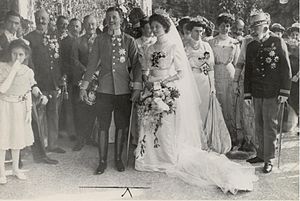She’s been worn by a saint and an empress, but you’ve probably never heard this name.
Thanks to Shannon for suggesting Zita as our Baby Name of the Day.
A thirteenth century Tuscan servant girl was destined for greatness. Despite harsh working conditions and her young age, Zita was a diligent servant in the Fatinelli household in Lucca. She went from low man on the totem pole to head housekeeper, performing chores as if they were a privilege, proclaiming her faith the whole time. She’s now the patron saint of servants.
She’s known as St. Zita. Was it her given name? Maybe. Her last name has been lost to history. As for the origins of her first name, I’ve heard it comes from:
- The Tuscan word for little girl – zita. The Italian word for girl is ragazza; bambina is used for a little girl. But Zita would’ve spoken a dialect.
- There is an Italian word – zitella – for maid, but I can’t tell if it refers to an unmarried woman, or a housekeeper.
- Medieval Italian names regularly used the letter z, but the closest name I could find to Zita was Citha – which feels like a stretch, though she was recorded as St. Sitha in England.
- Zita feels like a diminutive for established names – think of Rita or Nina.
- This tracks with another suggested origin for the name – a short form of Sidonia or Felicitas, though these seem tied to Eastern Europe. Zyta is another spelling found in Slavic countries.
Zita is not a well-known saint in the US today, but she once had quite a following.
The name remained in use, too:
- Princess Zita of Bourbon-Parma married Emperor Charles of Austria in 1911. Her full name was Zita Maria delle Grazie Adelgonda Micaela Raffaela Gabriella Giuseppina Antonia Luisa Agnese. (And you though Uma went overboard!) Zita was the seventeenth child, give or take, of Robert I, Duke of Parma. Dad lost his duchy to the unification of Italy, but the family remained wealthy and most of the kids made impressive marriages. Zita was born at the Villa Borbone della Pianore, in the saint’s hometown.
- Zita Johann was an actress, Boris Karloff’s co-star in The Mummy. She was born Elisabeth in Germany, and I can’t confirm when – or why – she changed her name.
- Then there was Ellen O’Keefe, born in Ireland and trained as a nurse. O’Keefe came to New York and opened a home for women in dire straits. It eventually became a religious order, and O’Keefe was known as Mother Zita, the founder of St. Zita’s Home for Friendless Women. Given O’Keefe’s vision, the patron saint of servants seems like a good fit.
- Zita Jungman was one of the Bright Young Things in the 1920s, a group of well-born, affluent young people indulging in extravagant nightlife in 1920s London.
- Two Belgian princesses currently have Zita in their name: Princess Maria Laura Zita Beatrix Gerhard and Princess Laetitia Maria Nora Anna Joachim Zita.
Zita was used in the US, too, but has never been popular. Just eleven girls received the name in 2011. Still, if you’re looking for an unexpected and zippy Z-name, or a different Catholic saint to consider, Zita might be the one for you.





My grandmother’s name was Macel Zitta
She had no idea why or where the name came from! My grandmother born 1909.
We’re trying to help my daughter name her new baby. First name to be Lyra.
My name is Zita, and I love it!
I am writing from Hungary, probably home of most Zitas in the world. And I can confirm that Zita is considered a stylish name that is both old-school and very contemporary here. It started to regain appreciation in the seventies, waves followed and it is steadily in the first 100 names ever since. Still considered somehow urban as it sounds both serious, media-compatible and thus even a bit pretentious for some. It first got popular around 1916, when princess Zita Bourbon-Parma, already wife of prince Charles Habsburg the 4th, ruling the Austro-Hungarian Empire, became crowned as King and Queen of Hungary, the very last monarchs of the country. After the end of WW1 they got exiled and the Habsburg empire ceased to exist but he never really resigned from the throne. Anyway, the Hungarian people liked queen Zita, a name quite unheard of until then, and soon it became chic within upper classes. This resulted in two glamourous film stars in the 30’s called Zita. The WW2 came, after that communist rule, and the name Zita was considered royalist and bourgeois, on the blacklist of names, so very few parents dared to give it to their girls. And from the early seventies, they felt free again to name girls after pre-war celebrities.
Zita strikes me as very much a nickname. It could be a fun twist on traditional Elizabeth nicknames.
I think so, too – in fact, my first guess was that Zita was derived from an elaboration, like Teresita. If that’s the case with the original bearer, it is lost to history … But it does sound like a short form, doesn’t it?
I had an aunt Zita (who I htink was actually a grandmother’s cousin), but she was an Elizabeth (or possibly Elizabetta?)
I know an elderly Zeta, whose full name is Elizabeta.
The two Belgian princesses are named after their great-grandmother, the Empress Zita you mentioned above. The process of beatification for Empress Zita opened in 2009. Her husband, Karl, the last emperor of Austria, was beatified in 2004.
I quite like the name – exotic and fun to say, but with a humble, religious history.
I think Waltzing may have hit the nail on the head: Zita from Teresa by way of Teresita. In Portuguese, it would be Teresinha and a lot of other names take the nn -zinha (like Soniazinha for Little Sonia), so Zita may just mean “little one”.
I had an Italian friend at school called Teresa, and her aunt was named Zita (the family was originally from Tuscany, so I’m guessing the local saint was the inspiration for her name).
I think to Teresa, Zita was a dowdy old-fashioned aunt-type name (poor auntie was probably only about the age I am now!), but I thought it was really cool and unusual – and I’ve never met another one.
Although it sounds very Italian to me, according to the records, it was common amongst Irish Catholics, and there are lots of Zita Kellys and Zita O’Rourkes to be found.